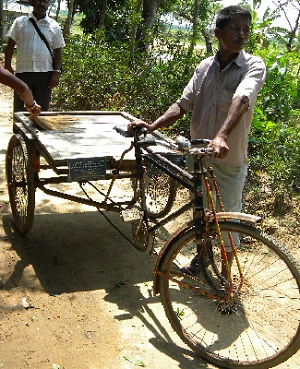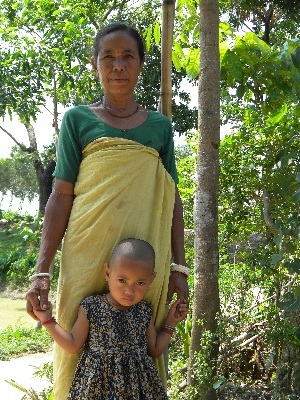Nestled in the Garo hills of Netrokona district, Birisiri is one of the northernmost areas of Bangladesh and is populated primarily by minority tribal groups. Because of its remote location, the people of Birisiri face many obstacles. There are few training centers or schools, there are limited job opportunities, and families have few alternatives during medical emergencies.
Nestled in the Garo hills of Netrokona district, Birisiri is one of the northernmost areas of Bangladesh and is populated primarily by minority tribal groups. Because of its remote location, the people of Birisiri face many obstacles. There are few training centers or schools, there are limited job opportunities, and families have few alternatives during medical emergencies.
“It is never easy to drive up to Birisiri,” says CRWRC staff member Kohima Daring, “The heavy rains create severe potholes in the road. During the monsoon season, people often need to cross the swollen rivers by boat because some of the bridges get washed out. It makes you think about some of the difficulties women face during pregnancy and childbirth when they need to reach a health facility for prenatal and delivery care.”
That issue is one that CRWRC and its partners have been addressing. CRWRC uses a model of primary groups, central committees and people’s institutions throughout Bangladesh to empower people to address their own needs – including access to health care.
Primary groups are formed of men and women from the same village. These groups meet together regularly, pool their savings and receive training on topics such as adult literacy, maternal and child health, improved agriculture, leadership and small business management. These groups also make decisions together about projects that they’d like to work on. For the first three to five years, they receive support and advice from one of CRWRC’s partner organizations.
Community Central Committees (CCC) are made up from representatives of the various primary groups from the same union or geographic area. As primary groups graduate from receiving support from CRWRC partners, they move under the leadership of the CCC. Similarly, the People’s Institutions (PI) are made up of representatives from several CCCs. When a project or need arises from the primary groups, it is presented to the CCC and PI for follow up.
In Birisiri as various primary groups received training on maternal and child health, they identified lack of transportation as a major barrier to prenatal health. The distance to health centers, and the lack of affordable vehicles meant that families often couldn’t receive adequate health care in times of emergency. If they did procure a vehicle for emergencies, they had to take out a loan and were often charged large interest rates. As a result, many women and children were dying during childbirth.
While the communities could have waited for the government to build more health centers or asked a non-profit organization to provide them with one, they instead turned to their own resources by going to the PI.
The PI in Netrokona district recognized the need and developed a solution that could be obtained using only local funds. The PI encouraged primary groups to collect a small amount of money each month and put it into a PI-managed bank account. Now, when emergencies arise, group members and community health volunteers can apply to the PI for a non-interest loan from that emergency health fund. These loans can be given to anyone in the community, even those who aren’t members of a primary group. In the case of those in extreme poverty, provisions have also been made to provide assistance to community members without the loan having to be repaid.
In Birisiri the PI-managed fund has also been used to purchase a small “ambulance.” This simple bicycle-pulled cart is always available to transport people to the nearest medical center during times of need. These simple interventions have had a huge impact on the health of women and children.
“I feel well and am very thankful to the Peoples’ Institution for their generosity,” said Ritali, a young woman in Birisiri who used the ambulance for a 14 km trip to the health clinic, and whose family used the emergency health fund to pay for an emergency cesarean section to deliver Ritali’s daughter, Sunali. “I know that if they were not there to help me, Sunali and I would probably have died.”


